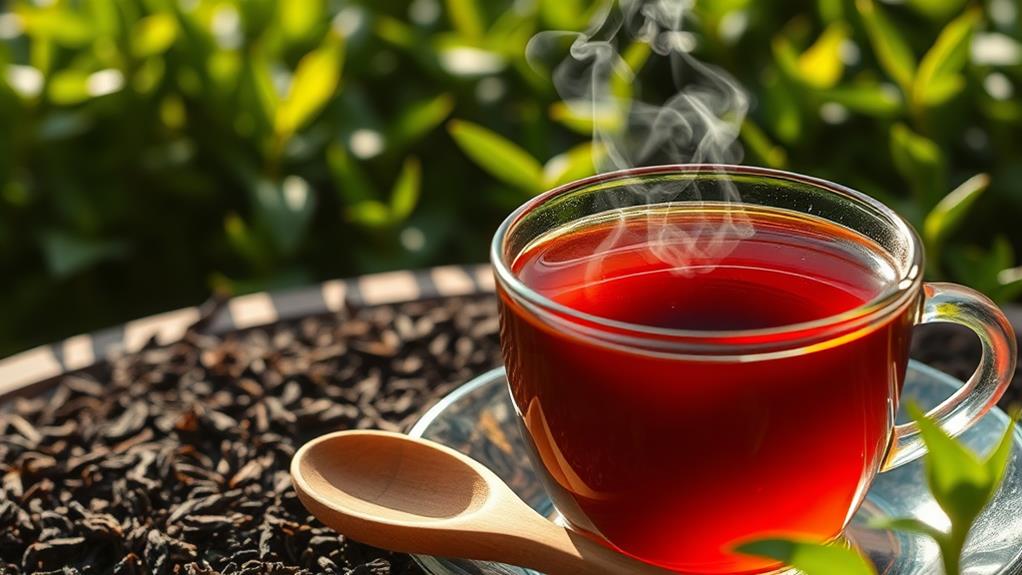Tannins are natural compounds found in plants, giving your tea its unique flavor and color. They're especially abundant in black and green teas, influencing how a tea tastes—more tannins lead to a bolder, slightly astringent flavor. These compounds aren't just about taste though; they're packed with antioxidants that can boost your health. Tannins support heart function and improve gut health, making your cup of tea even more beneficial. So, the next time you enjoy a warm sip, remember they're a big part of what makes tea so special! Curious about how to brew the perfect cup?
Definition of Tannins
What exactly are tannins? You might've heard the term thrown around, especially when discussing tea or wine, but it's time to unravel this intriguing topic. Tannins are naturally occurring compounds found in many plants, playing a crucial role in their chemistry.
These polyphenols can contribute to the taste and color of your favorite beverages. They're also known for their health benefits, as they're rich in antioxidants that can support heart function and overall wellness, making your tea not just enjoyable but potentially beneficial for your health.
There's a fascinating variety of tannins, each affecting flavor, mouthfeel, and even health benefits in unique ways. When you sip your tea, you're experiencing the delightful complexity of tannin chemistry at work. Some varieties, like catechins, add a refreshing astringency, while others might lend a richer, more robust flavor.
Tea offers exceptional health benefits with these compounds enhancing your overall experience.
But it's not just about taste; tannins also have antioxidant properties, making your tea not just enjoyable but potentially beneficial for your health. The world of tannins is diverse and exciting, inviting you to explore different types and their effects.
Sources of Tannins
When you think about tannins, it's important to recognize their plant-based origins, primarily found in various types of tea.
Each tea, whether it's black, green, or herbal, has its unique tannin content, which can even offer some health benefits.
Plant-based Origins
Tannins, naturally occurring polyphenols, are primarily found in various plant sources, playing a significant role in their defense mechanisms. These compounds help protect plants from pests and diseases while contributing to the flavor and color of many botanical sources you might enjoy. You'll find tannins in a wide array of plants, from the leaves of tea to the bark of certain trees.
Here's a quick look at some common plant origins of tannins:
| Plant Source | Tannin Content |
|---|---|
| Tea Leaves | High |
| Oak Bark | Very High |
| Pomegranate | Moderate |
| Grapes | Variable |
| Sorghum | Low |
Types of Tea
The diversity of tea types offers a fascinating exploration into the world of tannins. Each variety brings its unique flavor profile and tannin content, influencing your tea experience. For instance, the health benefits of tea are often enhanced by the presence of tannins, which contribute to the overall richness of flavor.
Here's a quick look at some popular types:
- Green Tea: Light and refreshing, with a delicate tannin touch.
- Black Tea: Bold and robust, packing a strong tannin punch.
- Oolong Tea: A delightful middle ground, balancing flavors and tannins.
You'll also find herbal tea, which often has minimal tannins since it's made from herbs, spices, and fruits.
Then there's white tea, the least processed, offering a subtle and sweet taste with lower tannin levels.
Pu erh tea stands out for its fermented richness, while chai tea combines black tea with spices, creating a warming, flavorful brew.
Finally, flavored tea adds an exciting twist, where fruit or floral notes mingle with the tannins, enhancing the drinking experience.
Understanding these variations not only enriches your tea journey but also deepens your appreciation for the intricate role tannins play.
Health Benefits
Rich in antioxidants, tannins in tea offer a range of health benefits that can enhance your well-being. These natural compounds can boost your health in ways you mightn't expect.
For starters, tannins are known for their ability to improve tannin absorption in your body, helping you make the most of the nutrients in your tea. This means every sip can be a step toward better health! Additionally, regular tea consumption has been linked to reducing chronic disease risk, making it even more beneficial.
One of the most impressive benefits is their positive digestive effects. Tannins can help regulate your digestive system, potentially easing that uncomfortable feeling after a heavy meal. They can even act as a mild astringent, which might help with inflammation in your gut.
Plus, their antioxidant properties can combat free radicals, supporting overall health.
Drinking tea rich in tannins may also contribute to heart health by promoting healthy blood flow and reducing cholesterol levels.
Tannins in Tea Varieties
When you sip on different types of tea, you're not just enjoying a warm beverage; you're also tasting a range of tannins that vary by variety.
These tannins can impact not only the flavor profile but also bring along some surprising health benefits.
Types of Tea Tannins
Tannins vary significantly across different types of tea, influencing both flavor and health benefits. Each tea type has its unique tannin profile, giving you a delightful range of experiences.
For instance, you might find:
- Green tea: light and grassy, with a refreshing taste, often paired with its high antioxidant content that may boost metabolism health benefits of tea.
- Black tea: bold and robust, perfect for a morning pick-me-up, and known for potential benefits like improved gut health.
- Herbal tea: often caffeine-free, offering a soothing experience.
In more specialized varieties, chai tea brings a spicy warmth, while matcha tea offers a creamy, umami flavor thanks to its finely ground leaves.
Oolong tea strikes a balance between green and black, delivering a floral aroma. If you're into aged teas, pu erh tea has a rich, earthy profile that can surprise your palate.
Flavored and iced teas add another layer of enjoyment, making them popular choices for summer sipping.
Each type of tea not only brings unique aromas and flavors but also distinct tannin characteristics that can affect your overall experience.
Health Benefits Explained
Drinking tea not only offers a delightful experience but also comes with a range of health benefits linked to its tannin content. Tannins are natural compounds that can work wonders for your body. They help improve your gut health by promoting good digestion and balancing the bacterial environment in your intestines.
Additionally, the rich antioxidant properties of tannins are instrumental in supporting overall wellness, as they help protect the body from oxidative stress and enhance antioxidant absorption, ensuring your body fights off free radicals effectively.
If you're concerned about tannin sensitivity, don't fret! Most people can enjoy tea without issues, but it's essential to listen to your body. Some individuals may experience mild discomfort, while others might find that tannins help their digestive processes.
Incorporating different tea varieties into your routine allows you to enjoy the unique benefits each has to offer. Green tea, for instance, is known for its high tannin content and can support heart health. Black tea, on the other hand, may help lower cholesterol.
Flavor Profile Impact
Various tea varieties showcase distinct flavor profiles, largely influenced by their tannin content. When you sip your favorite brew, the tannin complexity plays a crucial role in shaping your flavor perception. Each type of tea has its own unique balance of tannins, which can lead to a delightful experience or a slightly astringent one.
Green tea, for instance, not only offers a lighter taste but also comes with health benefits that enhance overall wellness, making it a refreshing choice for those seeking health benefits.
Consider how different teas can tantalize your taste buds:
- Black Tea: Rich and bold, it often has a robust flavor, with tannins adding depth and warmth.
- Green Tea: Light and grassy, its lower tannin levels create a fresher, more delicate taste.
- Oolong Tea: With a beautiful balance between black and green, its tannins offer a smooth, floral quality that dances on your palate.
As you explore these varieties, you'll notice how the interplay of tannins affects your enjoyment. A higher tannin content can create a more astringent taste, while lower levels might make the tea feel smoother.
Understanding this relationship helps you appreciate the nuances in each cup, enhancing your tea-drinking adventure. So, next time you brew a pot, think about how those tannins are shaping your experience!
Impact on Flavor Profile
When you take a sip of tea, the complex interplay of flavors often surprises you, and tannins play a crucial role in this experience.
These natural compounds, extracted from the leaves during brewing, contribute significantly to your flavor perception. You might notice that the tannins add a certain astringency, making your mouth feel slightly dry, which can enhance your enjoyment of the tea.
As you explore different types of tea, you'll find that the level of tannin extraction varies, influencing the overall taste.
For instance, black teas generally have higher tannin levels, resulting in bolder flavors. In contrast, green teas tend to be lighter and less astringent, allowing more delicate flavors to shine through.
This variability invites you to experiment with steeping times and temperatures, discovering how each choice alters the tea's flavor profile.
Health Benefits of Tannins
Tannins in tea offer a range of impressive health benefits that can enhance your overall well-being.
These unique compounds play a significant role in how your body absorbs and metabolizes various nutrients. By drinking tea rich in tannins, you might experience:
- Improved digestion: Tannins can help soothe your stomach, making it easier for your body to break down food.
- Antioxidant properties: They combat harmful free radicals, potentially reducing the risk of chronic diseases.
- Enhanced heart health: Tannins may contribute to better blood circulation and lower cholesterol levels.
When you sip on a cup of tea, the tannins interact with your body, promoting healthy tannin absorption and boosting tannin metabolism.
This means that not only are you enjoying a flavorful beverage, but you're also giving your body a natural health boost.
Tannins and Astringency
Feeling the slight puckering sensation in your mouth after sipping a strong cup of tea? That's astringency at work, and it's largely due to tannins. These natural compounds are responsible for that unique feeling as they interact with proteins in your mouth.
When you experience a high level of tannin extraction, like in bold black teas, the astringency perception intensifies, leaving you craving a sip of something sweeter to balance it out.
Astringency isn't just a quirky sensation; it's a key factor in how you perceive the flavor of your tea. If you've ever enjoyed a cup that felt dry on your palate, you've encountered a strong tannin presence.
Not all teas are created equal, though. Green and white teas typically have lower tannin levels, leading to a smoother feel that's less puckering and more refreshing.
Brewing Techniques and Tannins
Brewing tea can significantly influence the level of tannins extracted, affecting both flavor and astringency. To achieve the perfect cup, you'll want to pay attention to several key factors, including brewing temperature, steeping time, and water quality.
Different tea varieties have unique needs, so experimenting with various infusion methods can lead to delightful discoveries.
Here are some tips to keep in mind:
- Brewing Temperature: A cooler temperature can yield a smoother taste, while hotter water extracts more tannins.
- Steeping Time: Shorter steeping times can balance your tea's flavor, while longer times might intensify astringency.
- Water Quality: Pure, fresh water can enhance flavor extraction and improve your overall experience.
When you combine these elements with the right brewing equipment and style, you can control tea concentration and create a taste balance that suits your palate.
Whether you prefer a delicate green tea or a robust black tea, mastering these brewing techniques empowers you to craft a cup that's just right.
Tannins in Other Beverages
Many beverages beyond tea contain tannins, contributing to their unique flavors and mouthfeel. When you sip coffee, you might notice the presence of coffee tannins, which add a slight bitterness and astringency to the brew. These tannins can enhance the depth of flavor, making your cup of joe even more enjoyable.
Wine is another great example, with wine tannins derived from grape skins, seeds, and stems. They can create a rich, complex taste, helping the wine age gracefully over time.
If you're a chocolate lover, you'll find cocoa tannins in dark chocolate drinks, giving them that delightful bitterness.
Even fruit juices can have fruit tannins, which lend a refreshing zing to beverages like grape or pomegranate juice.
Beer enthusiasts might be surprised to learn about beer tannins, often originating from the grains and hops used in brewing, adding body and texture.
Lastly, herbal teas and infusions contain herbal tannins, which can provide a variety of flavors and health benefits.
Managing Tannin Levels in Tea
While enjoying a cup of tea, you mightn't realize that managing tannin levels is crucial for achieving the desired flavor and astringency.
Tannin management is all about fine-tuning your brewing process to create the perfect balance. Here's how you can innovate your tea experience:
- Choose the right tea leaves: Different varieties contain varying tannin levels, so pick ones that suit your taste.
- Control steeping time: A shorter brew time results in lower tannin extraction, giving you a smoother flavor, while longer times can intensify astringency.
- Adjust water temperature: Cooler water extracts fewer tannins, while boiling water can lead to a more bitter cup.
Finding the optimal brewing method can transform your tea ritual.
Experiment with these elements and discover how small adjustments can dramatically change your tea's character.
You'll be surprised at how a few minutes or degrees can lead to a delightful brew that's just right for you.
Plus, it's a fun way to engage with your beverage!
So, next time you steep, remember: your cup of tea is a canvas for innovation.
Happy brewing!
FAQ
Can Tannins Cause Allergic Reactions in Some Individuals?
Yes, tannin sensitivity can trigger allergic symptoms in some individuals. If you experience reactions like itching or swelling after consuming tannin-rich foods or drinks, it's wise to consult a healthcare professional for guidance.
Are There Any Specific Tea Brands Low in Tannins?
If you're seeking low tannin options, look for tea brands like white tea or certain herbal blends. These selections usually offer a smoother taste and can enhance your innovative tea experience without the tannin intensity.
How Do Tannins Affect My Body's Nutrient Absorption?
Isn't it ironic how something meant to enrich your tea can hinder your nutrient absorption? Tannins can interfere with nutrient interactions, reducing your body's ability to absorb essential vitamins and minerals effectively.
Do Tannins Have Any Impact on Food Pairings With Tea?
Tannins influence tea compatibility by enhancing or clashing with food flavors. You'll find that their astringent taste can elevate certain dishes while overpowering others, so experiment to discover innovative pairings that highlight your tea's unique tannin flavor.
Can I Remove Tannins From My Tea After Brewing?
You can't completely remove tannins after brewing, but you can experiment with brewing techniques. Try shorter steep times or cooler water to minimize their presence, enhancing your tea's flavor and making it more enjoyable.
Final Thoughts
In conclusion, tannins play a significant role in tea, shaping its flavor and offering health benefits. They're like the unsung heroes of your cup, adding depth and a touch of astringency that makes each sip interesting. Whether you're enjoying a robust black tea or a delicate green one, understanding tannins can enhance your tea experience. So, the next time you brew a cup, remember: those tannins are there for a reason, making your tea not just a drink, but an adventure!



